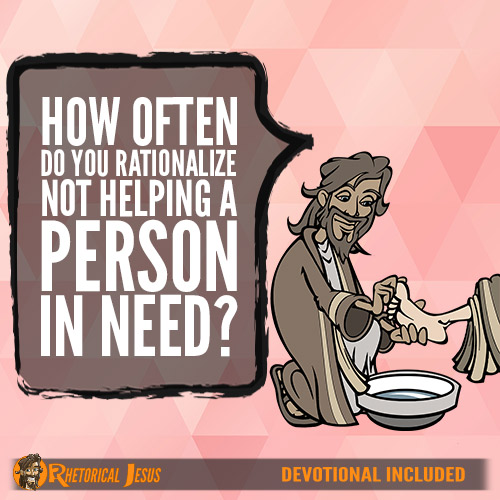James 2:15-16
If a brother or sister is poorly clothed and lacking in daily food, and one of you says to them, “Go in peace, be warmed and filled,” without giving them the things needed for the body, what good is that?
Assumptions
I heard a man actually say about someone a church helped years ago that he wouldn’t have helped him and said, “He made his own bed, so now let him sleep in it.” This man didn’t know the whole story. He was a faithful church member but lost his job due to a freak accident, and since he was self-employed and had only liability insurance on his vehicle, he lost his job, too, because he was a newspaper carrier. The man was trying to rationalize his not helping this man hurt in the accident and who’d lost his job by saying he must have done something wrong and, therefore, the church shouldn’t help him. This man assumed wrong. Fortunately, there were enough people who knew what really happened and helped him, and now he’s back on his feet and working again and even supports the church with his offerings. The one man had assumed that he only wanted to take advantage of the church, but that was not true at all. Have you ever done that? Do you know someone who has tried to rationalize not helping someone with a very real need?
A Dead Faith
James once asked what good is it if a brother or sister is poorly clothed and hungry and somebody says “Go in peace; be warmed and filled” but doesn’t help them at all (James 2:15-16). What good is that? That’s like saying “I’m really sorry; I’ll pray for you” but then doing nothing to help them in their real need. What kind of faith is that? James calls it a dead faith (James 2:17). We are commanded to share what we have with the Lord’s people who have need, which is called practicing hospitality (Romans 12:13). The author of Hebrews says that we shouldn’t ever neglect doing good for others and to share what we have because these are the kinds of sacrifices that are very pleasing to God (Hebrews 13:16).
Rationalizing
Some people rationalize their disdain for society, possibly because they’re unemployed or under-employed, that it’s okay to steal. At a job I had a few years ago, employees customarily stole from the company and rationalized it by saying, “The company’s making millions of dollars, so they won’t mist it. It won’t hurt them.” That won’t fly in a court of law. You can try to rationalize helping yourself all you want–it’s still stealing. That might have even been a problem in Paul’s day and why he told the church at Ephesus to stop stealing and work for a living so that they’ll have something to share with those in need (Ephesians 4:28). The so-called “virtuous woman” in Proverbs 31:20 is a woman who opens her arms to the poor and extends her hands to the needy. Jesus Himself said that it’s more blessed to give than to receive (Acts 20:35b). Galatians 6:10 says that every time we have opportunity, let us do good to all people, especially those who belong to the family of believers. Even so, many rationalize not helping others by assuming they don’t deserve help, thus rationalizing their refraining from helping those in need. How often have you done that? I know I have.
A Closing Prayer
Father, please forgive my tendency to rationalize not helping others, just like I do with trying to rationalize my sins. I have no excuse. Please help me see them the way You see them and not try to explain it away so that I won’t feel I need to help someone in real need. In Jesus’ name I pray.
Amen
Republished by Blog Post Promoter





